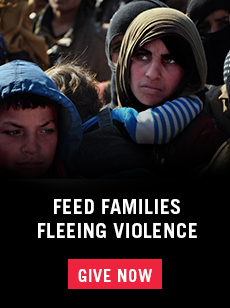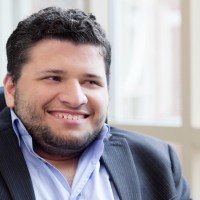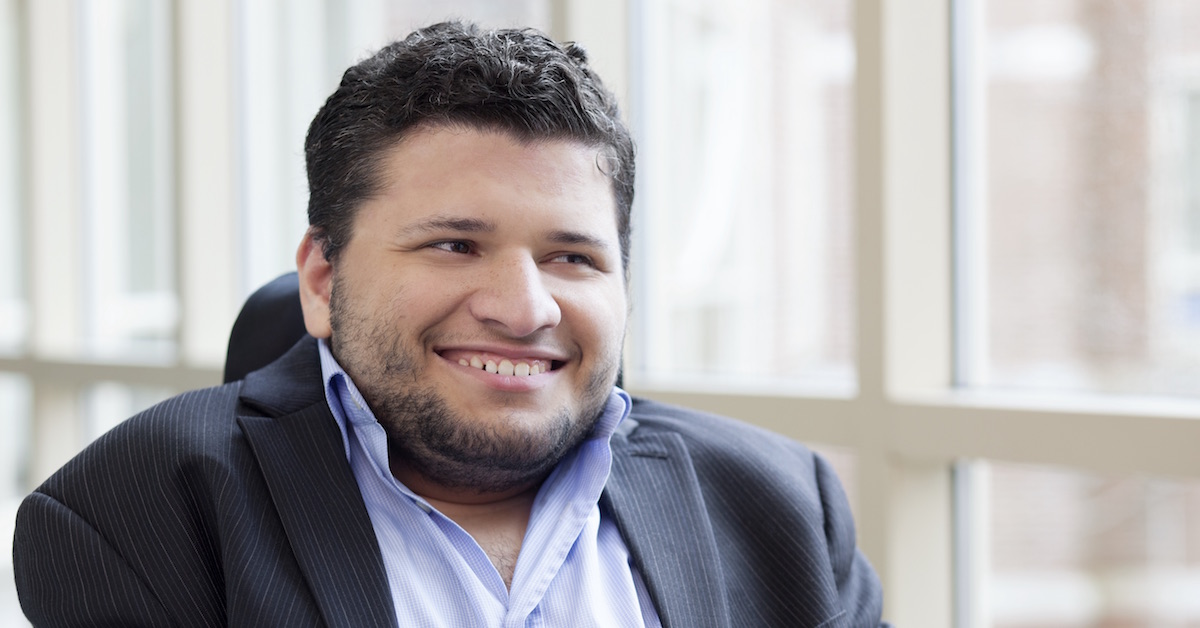“I got a phone call from my mom. She said she could no longer come and see me.”
Mousa al Mosawy, 24, is in his second year of law school at Boston College. He’s an avid fan of the U.S. Constitution. And he is unsure of his future after President Trump’s executive order halting immigration to the U.S. from his home country of Iraq.
Mousa first came to America as a teenager. His mom, Hala al-Saraf, runs the Iraq Health Access Organization (IHAO)—one of Preemptive Love Coalition’s key partners in Iraq—providing relief aid for families fleeing violence. Seven years ago, she was part of the Fulbright program at Columbia University. Mousa, who was born with scoliosis and spina bifida, accompanied her.
He quickly fell in love with the United States.
“It felt a lot more like freedom than anything I had known at home,” he says. “Instead of being cared for, I could do my own thing. I could be independent. When I went back to Iraq, my goal was to study in the United States.”
Mousa grew up under Saddam’s regime, at a time when sanctions were crippling the country and keeping him from getting the best possible medical care. “When I had surgeries there,” he says, “there wasn’t the right equipment. So obviously, it had an effect on my condition.”
He’s relied on a wheelchair since age 13. As a child in the Middle East, he had to be carried in and out of classrooms. People were always supportive and helpful, he says. “But it was not an ideal situation. That’s why I came [to the U.S.]. That’s why I was hoping to work here.”
It was the promise of independence that drew Mousa to America. Here, disability was not as much of a barrier to achievement or independence. “This is a place where I can have a life,” he says. “I can go to the store and get things.”
“Studying the law was enriching,” he adds. “It’s an empowering experience here in the States.”
“That all changed a week ago.”
The executive order, announced last week, cast uncertainty over Mousa’s life—and his mother’s. Hala normally visits Mousa in Boston five or six times a year. “Even during my undergrad,” Mousa says, “I had upwards of four or five surgeries. It was hard, not because I needed my mother to be here, but because I knew she would not be fully rested if she was not here.”
Last week, when Hala went to board a plane in Baghdad, she was turned away. Airline employees told her she wasn’t allowed to board because she wasn’t on the right list. Hala holds a non-immigrant visa allowing her to enter the U.S. She comes regularly to visit her son and to meet with partners in the U.S. government, the U.N., and other nonprofit organizations, who support her work helping Iraqi families rebuild after violence.
“If [the law] is too broad, you might end up losing a lot of people who are trying to help you win this war. Someone like my mother.”
– Mousa Mosawy, 24, Boston College law student from Iraq
Despite a temporary restraining order issued by the U.S. District Court of Massachusetts on January 29, Hala was denied entry. The ruling instructs U.S. Customs and Border Protection (CBP) not to detain those holding valid immigrant or non-immigrant visas—and to inform international airlines flying to Boston Logan Airport that valid visa holders should be permitted to enter the country.

“This has not happened,” Mousa says. According to him, CBP have not yet responded to the court order. This week, the Massachusetts congressional delegation sent a letter to the Boston-area CBP Office requesting their compliance.
Meanwhile, Mousa wonders about his future in America. He’s just over halfway through his law school program. “I’m half a lawyer,” he jokes.
Since the executive order, Mousa’s received strong support from his school and hundreds of his classmates—across political and religious lines. “The support has come from conservatives, liberals, people of all religions,” he says. But he wonders how much it will help in the long run.
“I have less of a voice than anybody here,” Mousa says. “I’m disposable.”
He talks about how minor offenses, like shoplifting, can get someone on a student visa—like him—sent back to their home country. Then he shares how, the other day, he was nearly out of his school cafeteria when we realized he’d forgotten to pay for a sandwich. “I could be deported for this,” he thought as he quickly turned back.
The executive order also casts doubt over Mousa’s post-law-school career. “We’re hearing that it’s also going to affect H-1B [employment] visas,” he says. Mousa recently accepted a summer job at a law firm, but now he wonders whether he will be allowed to take it.
“When you lose your second-year summer job as a law student,” he explains, “you’ve basically lost your job after law school. This whole plan I had for myself and my career is unraveling.”
Mousa is not without hope—you don’t get this far and overcome this many challenges without an armload of hope. He believes that as people see the unintended impact of the executive order on ordinary people like him, many will take a second look.
“We talk so much about how such-and-such policy does this for people,” he says. “We argue about pros and cons… and a lot of things get lost in translation—like what these policies do when they’re tangible, when they affect you personally.”
He continues: “The people I’ve met who agreed with some form of this policy—once they saw the effect of it, they don’t necessarily agree with that. Once you interact with someone and get to know them, you have a much better understanding of where they’re coming from. And you’ll start thinking about policy in a different way.”
“This whole plan I had for myself and my career is unraveling.”
– Mousa Mosawy, 24, Boston College law student from Iraq
Mousa also respects the concerns of those who want to make sure their country is safe from terrorist attacks.
“I understand the person who turns on the TV and sees Iraq and Syria and sees the destruction,” he says. “Then they see what’s happened in Europe. And they don’t want that in the U.S. I understand the response.”
“But when it comes to legislation,” he adds, “laws are supposed to reflect the will of the people in ways that are constitutional and smart. If it’s too broad, you might end up losing a lot of people who are trying to help you win this war. Someone like my mother, who is trying to get help and eliminate threats to her country, which in turn eliminates threats to the U.S. This is someone who’s trying to help people rebuild after ISIS carnage, which in turn helps the U.S.—because people are less likely to be radicalized when there’s less of a vacuum for terrorist groups to jump into.”
“Allowing someone like Hala al Saraf to come to the U.S.—that’s in the national interest.”


